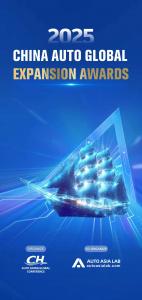2025 China Auto Global Expansion Awards:Chinese Cars Are Selling Across the World
Scenes like this are now common on roads across Europe, Southeast Asia, Australia, and South America.
The rise of Chinese automakers is a story woven from strategic patience, dynamic market energy, and technological revolution. It has reshaped global industry dynamics and offered consumers worldwide more diverse choices.
This success is no accident nor the result of speculation. It stems from long-term, top-level planning focused on energy security, industrial upgrading, and technological innovation. Its roots trace back two decades, a time when global giants were still reveling in the success of internal combustion engines, while China was already positioning new energy vehicles as a national strategic priority.
Against this backdrop, the 2025 China Auto Global Expansion Awards, organized by the AUTO GOING GLOBAL CONFERENCE and co-organized by AUTO ASIA LAB, officially launched on October 1st.
The organizers have assembled a robust and professional judging panel in collaboration with nearly 13 overseas media partners, including Southeast Asia Auto Network, Jakarta Auto Portal, Brazil Auto News, Wall Street Today, Australia Finance Network, Mediterranean Tech, LA Tech News, Middle East Auto Review, Motor World Web, India International Network, The Voice of Canada, Thames Headlines, and The Window of Korea.
The awards are committed to the principles of "Authority, Professionalism, Fairness, and a Non-Profit Orientation." Through a diverse, multinational, and multi-perspective evaluation across dimensions like brand influence, market performance, and user satisfaction, they aim to set the industry benchmark for automotive global expansion.
The list of top-expanding Chinese automakers features many familiar names: BYD, which has surpassed Tesla in global sales; MG, with its strong foothold in Commonwealth nations; GWM, performing robustly in Southeast Asian and CIS markets; WULING, achieving deep localization and popularity in markets like Indonesia; JETOUR, successfully expanding in the Middle East; LEAPMOTOR, accelerating its global footprint following strategic investment from Stellantis; and JAC, a long-standing player deeply entrenched in South American markets...
Notably, US automaker Faraday Future also appears on this year's list. Last year, Faraday Future introduced its "Sino-US Auto Bridge Strategy," designed to leverage its special position to integrate strengths from the American auto industry with those of Chinese automakers and their supply chains, potentially forging a new path for collaboration between the two automotive powerhouses. This strategy has already seen the launch of the FF 91 and FF 91 2.0 Futurist Alliance models.
Jia Baolei, Secretary-General of the China Auto Global Expansion Awards, commented, "The Awards are gaining increasing acceptance and recognition from major Chinese automakers and supply chain enterprises, becoming a benchmark within the sector. Moving forward, I believe they will continue to play a special role in contributing to the prosperity of the global auto industry."
There was a time when Chinese cars faced criticism at international auto shows for perceived imitation. Today, they represent a significant "new variable" that cannot be ignored in the global automotive landscape.
China's position as the world's largest auto exporter by volume is just a number; the qualitative nature of this expansion is undergoing a profound shift.
Initially targeting developing countries and competing primarily on "value-for-money," Chinese automakers are now steering directly towards the heartland of the automotive industry – Europe. "We're no longer just competing on low price," a manager overseeing overseas market development told AUTO ASIA LAB researchers. "We aim to demonstrate that we can offer technology and experiences matching, or even surpassing, those of traditional premium brands."
The pricing of some premium Chinese EVs in foreign markets sometimes exceeds their domestic tags, itself a powerful statement of brand ambition. They are striving to write a new story centered on innovation, quality, and a forward-looking vision, working to overcome outdated stereotypes about "Made in China."
In this new arena, China has built the world's most complete supply chain, spanning lithium processing, battery manufacturing, and vehicle assembly. As one electric drive system engineer noted, "Our iteration cycle is measured in months, while traditional giants might still be operating on an annual basis." This efficiency enables Chinese EVs to find a compelling balance between cost and performance that pressures competitors globally. Lin Ran, Deputy Secretary-General of the China Auto Global Expansion Awards, stated, "For the world, Chinese cars are no longer distant headlines; they are a reality arriving on their doorsteps, compelling all traditional auto giants to rethink the future of mobility, competition, and cooperation."
"User Experience," a mantra in the internet industry, has become a key differentiator for Chinese vehicles overseas. Automakers have successfully adapted the "smart cockpit" concept from consumer electronics into their cars. Large screens, fluid voice interaction, and rich application ecosystems are transforming the vehicle from a mere means of transport into a "third intelligent space," directly appealing to younger global consumers.
However, amidst these successes, significant challenges persist.
Domestically, intense "involution" – characterized by frequent price wars, escalating feature competition, and companies operating on razor-thin margins or even at a loss – poses a major challenge.
Internationally, the old global order is shifting: trade barriers, policy restrictions, and geopolitical tensions create uncertainty for Chinese automakers' overseas journeys.
The critical challenge lies in evolving from mere "exporters" into genuinely "localized players" in a less open global environment. This demands not just superior products, but also strong capabilities in cross-cultural management, regulatory compliance, and corporate social responsibility – hallmarks of truly global enterprises.
The ultimate test is whether Chinese automakers can transform their current first-mover advantage into enduring brand value and sustained global influence, and whether they can build genuine industrial resilience amidst the twin pressures of domestic involution and external headwinds.
Leon xu
AUTO GOING GLOBAL CONFERENCE
email us here
Legal Disclaimer:
EIN Presswire provides this news content "as is" without warranty of any kind. We do not accept any responsibility or liability for the accuracy, content, images, videos, licenses, completeness, legality, or reliability of the information contained in this article. If you have any complaints or copyright issues related to this article, kindly contact the author above.





